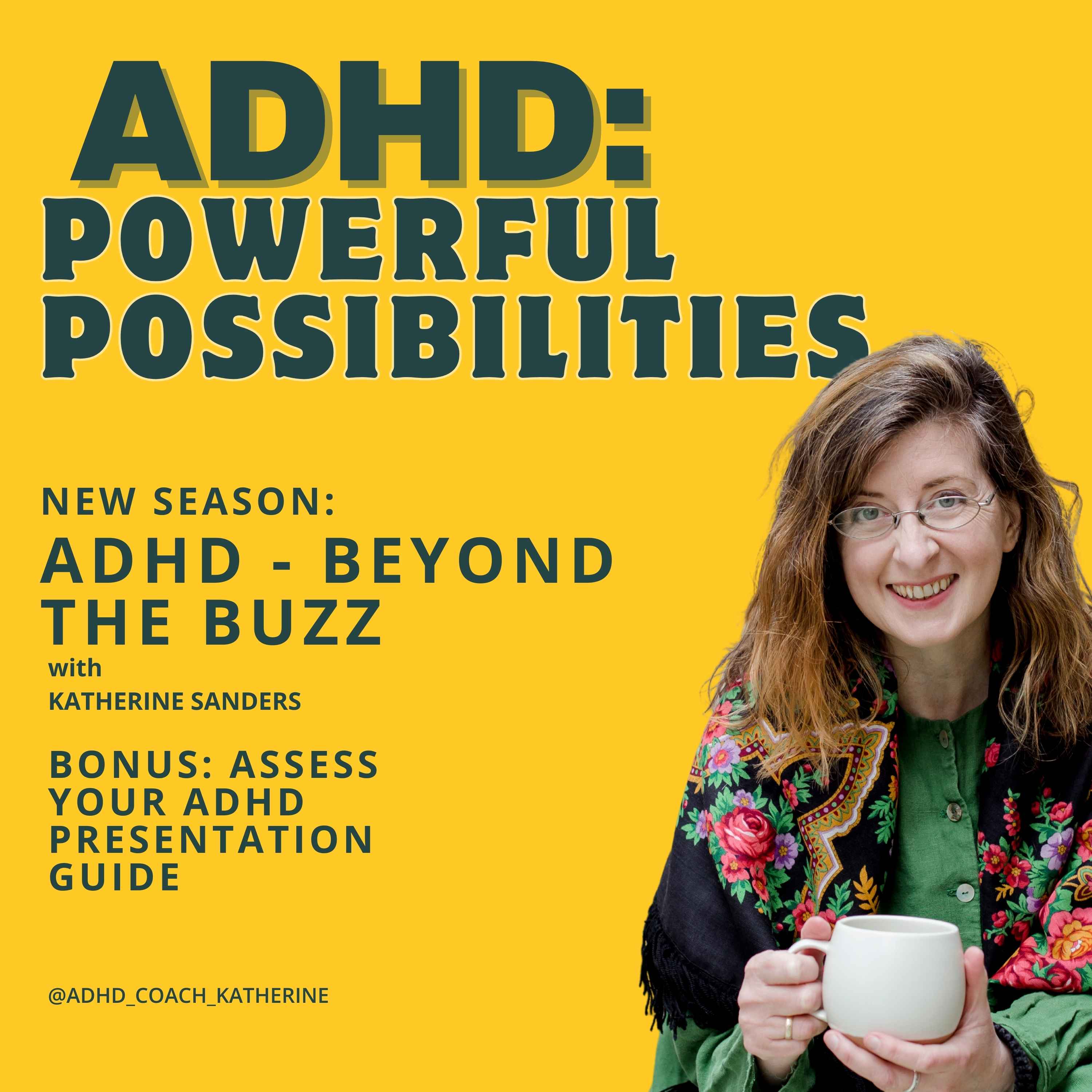ADHD Procrastination, Prioritising & Inertia - the solution isn't what you think.
ADHD Coach Katherine
Powerful Possibilities, ADHD: Overcoming Challenges and Looking Forward
Let's finish up this first season by discussing common challenges faced by those of us with ADHD, such as procrastination, prioritization, and inertia or 'ADHD paralysis'.
I highlight the importance of emotional regulation, acknowledging and tracking emotional states, and maintaining a mindful daily life.
I give you a sneak update on my upcoming 2024 series of webinars and workshops, and provide strategies on how those with ADHD can overcome their challenges.
The show also touches on how to manage tasks of importance that one may not find interesting, the impact of exercise on dopamine levels, and the use of journaling for tracking emotions towards tasks.
00:00 Introduction and Recap of the Season
00:31 Upcoming Webinars and Workshops
01:21 Recap on Time Management and ADHD
02:01 Understanding the Nature of ADHD and Time Perception
03:00 Overcoming Procrastination and Prioritization Challenges
04:27 The Role of Emotions in ADHD and Procrastination
05:19 Understanding Emotional Dysregulation in ADHD
08:07 The Impact of Depression on ADHD
09:17 The Role of Anxiety and Excitement in ADHD
10:01 Understanding Overwhelm in ADHD
12:22 Addressing Procrastination in ADHD
16:48 The Role of Emotions in Prioritizing Tasks
17:36 Understanding Procrastination and Emotional Dysregulation
18:03 Practical Strategies to Overcome Procrastination
18:14 The Eisenhower Matrix and Prioritization
18:49 The Role of Emotions in Task Prioritization
19:25 Making Uninteresting Tasks Interesting
21:39 Understanding and Overcoming Inertia
22:22 The Importance of Exercise in Managing ADHD
23:29 The Power of Taking Any Step Forward
25:00 The Role of Emotional Regulation in Procrastination, Prioritization, and Inertia
26:28 Practical Tools and Techniques to Manage Tasks
27:14 The Power of Journaling Your Emotions
28:34 Unlocking Your Potential and Overcoming Procrastination
29:51 Upcoming Webinars and Resources
30:30 Closing Remarks and Future Plans
Connect with Katherine here:
Undoing ADHD Paralysis Playbook: https://lightbulbadhd.thrivecart.com/undoing-adhd-paralysis-playbook/
Undoing ADHD Paralysis Playbook & Webinar recording:
https://lightbulbadhd.thrivecart.com/7-stepsadhd-paralysis-webinar/
Priority matrix - Your Brain's Not Broken
Barkley, R. A. (2001). The executive functions and self-regulation: An evolutionary neuropsychological perspective. Neuropsychology Review, 11(1), 1-29. [Focuses on the neurological aspects of ADHD and how they relate to self-regulation and emotional control.
Shaw P, Stringaris A, Nigg J, Leibenluft E. Emotion dysregulation in attention deficit hyperactivity disorder. Am J Psychiatry. 2014 Mar;171(3):276-93. doi: 10.1176/appi.ajp.2013.13070966. PMID: 24480998; PMCID: PMC4282137.
Mikami, A. Y. et al. (2015). Adults with ADHD: Variation in Perceived Stress and Overwhelm in Relation to Cognitive Functioning and Comorbidities. Adult ADHD, 1(1), 38-51.
Hirvikoski, T. et al. (2009). High incidence of anxiety and mood disorders among adults with ADHD: A Swedish population-based study. Psychiatry Research, 167(3), 251-260.
Sobanski, E. et al. (2010).Emotion in Adults with ADHD: Clinical Features and Therapeutic Implications. Journal of Attention Disorders, 14(1), 293-304.
Barkley, R. A. (2010). Emotional dysregulation is a core component of ADHD. In G. Barkley (Ed.), Attention-Deficit Hyperactivity Disorder: A Handbook for Diagnosis and Treatment (4th ed., pp. 81-115). Guilford Press.
Ferrari, J. R., & Tice, D. M. (2000). Procrastination as a self-handicap for men and women: A task-avoidance strategy in a laboratory setting. Journal of Research in Personality, 34(1), 73-83
Sirois, F. M., & Pychyl, T. A. (2013). Procrastination and the Priority of Short-Term Mood Regulation: Consequences for Future Self. Social and Personality Psychology Compass, 7(2), 115-127.
Sirois, F. M., & Pychyl, T. A. (2016). Procrastination, Emotion Regulation, and Well-being. In Procrastination, Health, and Well-being (pp. 163-188). Academic Press.
Martin, A. J., & Marsh, H. W. (2003). Fear of failure: Friend or foe?. Australian Psychologist, 38(1), 31-38.
Stoeber, J., & Otto, K. (2006). Positive conceptions of perfectionism: Approaches, evidence, challenges. Personality and Social Psychology Review, 10(4), 295-319.
Pychyl, T. A., & Sirois, F. M. (2016). Procrastination, Emotion Regulation, and Well-being. In Procrastination, Health, and Well-Being (pp. 163-188). Academic Press.
.Steel, P. (2007). The nature of procrastination: A meta-analytic and theoretical review of quintessential self-regulatory failure. Psychological Bulletin, 133(1), 65-94.
Nigg, J. T. (2017). Annual Research Review: On the relations among self‐regulation, self‐control, executive functioning, effortful control, cognitive control, impulsivity, risk‐taking, and inhibition for developmental psychopathology. Journal of Child Psychology and Psychiatry, 58(4), 361-383.
Barkley, R. A., & Murphy, K. R. (2010). Impairment in occupational functioning and adult ADHD: The predictive utility of executive function (EF) ratings versus EF tests. Archives of Clinical Neuropsychology, 25(3), 157-173.
Tice, D. M., & Baumeister, R. F. (1997). Longitudinal study of procrastination, performance, stress, and health: The costs and benefits of dawdling. Psychological Science, 8(6), 454-458.
Douglas, V. I. (1999). Cognitive control processes in Attention-Deficit/Hyperactivity Disorder. In H. C. Quay & A. E. Hogan (Eds.), Handbook of disruptive behavior disorders (pp. 105-138). Kluwer Academic/Plenum Publishers.
Nigg, J. T., & Casey, B. J. (2005). An integrative theory of attention-deficit/hyperactivity disorder based on the cognitive and affective neurosciences. Development and Psychopathology, 17(3), 785-806.
Gross, J. J. (1998). The emerging field of emotion regulation: An integrative review. Review of General Psychology, 2(3), 271-299.
Barkley, R. A. (2015). Attention-deficit hyperactivity disorder: A handbook for diagnosis and treatment (4th ed.). Guilford Publications.
Barkley, R. A. (2010). Emotional dysregulation is a core component of ADHD. In G. Barkley (Ed.), Attention-Deficit Hyperactivity Disorder: A Handbook for Diagnosis and Treatment (4th ed., pp. 81-115). Guilford Press.
Hölzel, B. K., et al. (2011). How does mindfulness meditation work? Proposing mechanisms of action from a conceptual and neural perspective. Perspectives on Psychological Science, 6(6), 537-559.

